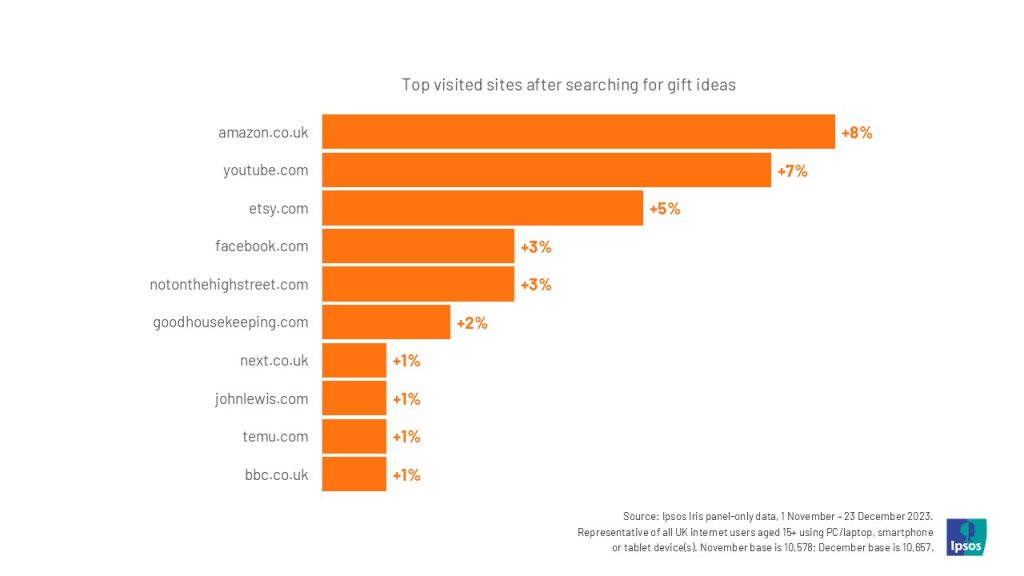Christmas. It’s a time for celebration, a time for togetherness, and, of course, a time for giving.
But what do you do if you don’t know what to give? Why, ask the internet, of course.
We’ve used Ipsos iris to look at people searching for gifts at Christmas time. More specifically, we’ve looked at people on the Google and Bing websites using search terms that include either ‘gift ideas’ or ‘gifts for…’ between 1 November and 23 December 2023.
Around 3.6 million people searched for gifts online using these search terms during this period, but who’s doing the searching? Who are they searching for? And where does their search take them?
Who’s making the list and checking it twice?
One of the biggest disparities in demographics when looking at who’s searching for gifts is around gender: twice as many women searched for gift ideas in November and December (68%) as men (32%). In fact, women aged 25-44 alone make up a third of all people searching for gift ideas. Or to put it another way, women in this age group are 154% more likely to search for gift ideas than men their age.
So, in general, if you’re looking to stand out in a sea of search results or be more specific in the terms your targeting, the greatest opportunity appears to be among female users.
As you might expect, people with children are also more likely to be searching for gift ideas. People with children aged under 15 in the household are 24% more likely to search for gift ideas compared to the total internet population (37% of searchers vs 30% of internet users).
One factor that doesn’t seem to make a huge difference is income. According to iris data, the income brackets of people searching for gift ideas closely mirror the total internet population. People are searching for gifts regardless of their income level.
Who are people searching for?
The first thing that jumps out when looking at the search terms used is how broad they are.
While the most used search terms are relatively simple – ‘gifts for men’ is the most common, just ahead of ‘gifts for her’ – there is a very long tail of more niche searches like ‘unique gifts for retired chemistry teacher’ or ‘gifts for Welsh Manchester United supporters’.
When we look for commonalities, we can see that age was often included, with one in five searches specifying an age or age group. This provides another opportunity for brands to bid on more specific search terms.
The data shows that half of searches were gendered – so included ‘men’, ‘mum’, ‘male colleague’ etc – but just 9% reference a partner or family member. Of the searches that name a family member, mum was the commonly searched for (31%) followed by dad (25%).
Where do the searches lead?
So once people have searched for gift ideas, where do they go next?
Unsurprisingly a retail brand is the most likely destination, with almost four in ten (38%) of the next steps we saw after a search leading to a retail site.
Amazon was the biggest individual retailer, making up the next step for 8% of all gift searches. Etsy was the second biggest retail brand, accounting for 5% of next steps taken, followed by Not On The High Street with 3%.
More surprising, perhaps, is the fact over six in ten gift searches don’t immediately land on a retailer. Clearly there is an opportunity for a broad range of brands to play and grow share in this space.

YouTube was the biggest brand outside of retail, making up 7% of next steps for gift searches. People aged 25-44 were the most likely to go to YouTube: they make up 34% of all internet users, but accounted for 51% of gift searches that went to YouTube.
The second biggest non-retail brand was Facebook (3%), which was followed by Good Housekeeping (2%). Good Housekeeping accounted for a higher share of next steps than the likes of Next, John Lewis and Marks & Spencer, showing the important role that publishers and content can play in the gift search space.
One of the great things about search is the flexibility it offers in allowing you to go broad with your targeting or very specific.
At a broader level, it’s important to recognise that women are significantly more likely to be completing gift searches than men, so strategies should reflect this.
However, there are significant opportunities to be more targeted, with half of all search terms being gendered, and one in five focusing on a specific age group.
Searches are more likely to end up on non-retail sites than retail ones, so there is a real opportunity for media owners to grow audiences, as well as help brands generate awareness and consideration. For brands, partnerships and promoted content provides another means of standing out and reaching shoppers, at the busiest time of year.
Technical Note:
Source: Ipsos Iris panel-only data, 1 November – 23 December 2023. Representative of all UK internet users aged 15+ using PC/laptop, smartphone or tablet device(s). November base is 10,578; December base is 10,657.
All search data is based on browser only. Data for this piece covers Google and Bing only. Here, gift searching is limited to search terms containing either ‘gift ideas’ or ‘gifts for [someone]’.
Demographic profiling of searchers is weighted to the UK internet population aged 15+.
Searches and search terms are based on 3,891 unweighted searches.

